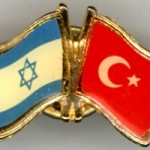Israel: Netanyahu Buys Time with Settlement "Freeze"
 Thursday, November 26, 2009 at 7:39
Thursday, November 26, 2009 at 7:39  On Wednesday, Israeli Prime Minister Benjamin Netanyahu announced that Israel would impose a 10-month freeze on construction in West Bank settlements:
On Wednesday, Israeli Prime Minister Benjamin Netanyahu announced that Israel would impose a 10-month freeze on construction in West Bank settlements:I hope that this decision will help launch meaningful negotiations to reach a historic peace agreement that would finally end the conflict between Israel and the Palestinians.
We have been told by many of our friends that once Israel takes the first meaningful steps toward peace, the Palestinians and Arab states would respond.
However, Netanyahu quickly clarified the nature of this "freeze." It would not include East Jerusalem, the ongoing construction including 3,000 new housing units, and basic requirements of "natural growth" in the West Bank. He explained:
We do not put any restrictions on building in our sovereign capital.
We will not halt existing construction and we will continue to build synagogues, schools, kindergartens and public buildings essential for normal life in the settlements.
Following Israel's announcement, one might argue that Washington's positive response was too quick, if not inappropriate. However, the wider picture remains. The Obama Administration has already declared its commitment to approach the issue through step-by-step negotiations, and that "Washington's position on the settlement issue both in the West Bank and East Jerusalem has not changed."
Secretary of State Hillary Clinton said, "Today's announcement by the government of Israel helps move forward toward resolving the Israeli-Palestinian conflict." US Mideast special envoy George Mitchell added,
"It falls short of a full settlement freeze, but it is more than any Israeli government has done before and can help movement toward agreement between the parties. Nothing like this occurred during the Bush administration." Clinton added the caution, hoewver, that the challenge still remained of meeting "the Palestinian goal of an independent and viable state based on the 1967 lines, with agreed swaps, and the Israeli goal of a Jewish state with secure and recognized borders that reflect subsequent developments and meet Israeli security requirements".
The Palestinian side quickly rejected Netanyahu's "concession". Chief Palestinian negotiator Saeb Erekat said there was nothing new in Netanyahu's announcement: "This is not a moratorium. Unfortunately, we hoped he would commit to a real settlement freeze so we can resume negotiations and he had a choice between settlements and peace and he chose settlements." And Palestinian Prime Minister Salam Fayyad put an end to the discussion, "What has changed to make something that what was not acceptable a week or 10 days ago [acceptable now]? The exclusion of Jerusalem is a very serious problem for us."
The Israeli right was no more happier with the Prime Minister's announcement. Yaakov Katz, member of the Knesset and chairman of the National Union Party, "It can't be possible that Netanyahu is spitting in the faces of those to whom he promised less than a year ago that he would constitute an alternative to Sharon's policy of uprooting."
So Washington may have grasped Netanyahu's announcement as the branch for talks which they have been seeking. Yet how is it going to be possible to urge Palestinians, including Palestinian Authority leader Mahmoud Abbas let alone Hamas, to agree? How sustainable is the prospect of meetings given the mistrust built over the wait, which lasted almost a year, for an Israeli "concession"?


 On Tuesday, the United Nations' Assistant Secretary-General for Political Affairs Haile Menkerios declared that political efforts for a negotiated two-State solution have reached
On Tuesday, the United Nations' Assistant Secretary-General for Political Affairs Haile Menkerios declared that political efforts for a negotiated two-State solution have reached  Turkish Foreign Minister Ahmet Davutoglu has confirmed that Israel has requested that Turkey resume its mediation of peace talks.
Turkish Foreign Minister Ahmet Davutoglu has confirmed that Israel has requested that Turkey resume its mediation of peace talks.  Speaking to Ma'ariv, Israel's Industry, Trade, and Labor Minister Binyamin Ben-Eliezer (Labor Party)
Speaking to Ma'ariv, Israel's Industry, Trade, and Labor Minister Binyamin Ben-Eliezer (Labor Party)